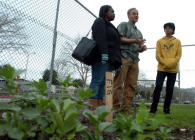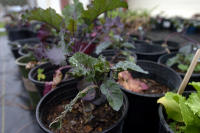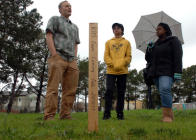Potential bounty seen in Richmond high school farm plots
Shelly Meron
Contra Costa Times
Students Johnny Hernandez, right, and Edtaniqua Moore, left, listen as Kennedy High School...



The damp, empty patch of earth just past the football field at Kennedy High School in Richmond doesn't look like much. Even teacher Park Guthrie admits it's "just weeds right now."
But Guthrie looks beyond the weeds and mud and sees the potential for sustainable farming of organic radishes, potatoes and cabbage to nourish students' bodies and minds.
"Instead of preaching about eating more produce, we want to engage kids in growing produce, and teach them about healthy foods as an alternative," Guthrie said. "By giving them the skills to grow their own healthy, organic, local foods, we're hoping they'll be empowered to become leaders in creating a healthier food system."
Guthrie and several students and volunteers will put that vision into practice Saturday and Sunday with the 2 Farms in 2 Days project. They will turn this strip of unused land into an 8,000-square-foot farm, then build a similar farm at Richmond High School during the same weekend.
"We've got this land not being used, abundant sunshine, ideal growing climate, and students with energy who want the chance to take leadership and have impact on their community," Guthrie said. "Bringing together all these needs and potentials, I think it will be a way for teens in Richmond to really make a tangible difference in making a healthier community."
Students who are involved in the project are ready to take charge and become partly responsible for providing decent food not only for their families but their peers.
"It's up to you to produce something that people will want to eat," said Edtaniqua Moore, a Kennedy High junior, explaining that many students who are busy with homework, sports and other activities eat whatever they can get without much thought.
"These are young people," sophomore Johnny Hernandez said. "We want our generation to be healthy."
Guthrie is a biology teacher at Kennedy and started the organization Urban Tilth, which is backing the project. The group focuses on building "a more sustainable, healthy, and just food system" in West Contra Costa, with a goal of getting the community to produce at least 5 percent of its own food supply.
Guthrie was inspired to expand the school farming effort after participating in several other garden projects in the district, specifically an urban agriculture and food system class at Richmond High last year. The class provided a community-supported agriculture service, producing 10 boxes of fresh vegetables every two weeks for its families to purchase.
"So many people signed up — we had way more than our production capacity. There were 70 families and each only got one box" over the course of the class, Guthrie recalled.
After that experience, Guthrie wanted to move beyond the typical small school garden that may not be around in a few years. At the same time, he saw several systemic problems to address: A lack of access to fresh produce in the area, an epidemic of obesity and diabetes, and the lasting effects of traditional agricultural practices on the environment.
"It was very clear there's a demand for healthy, organic produce in the community. It was very clear that the kids were jazzed, and felt good about being able to provide that to their community," Guthrie said. "The limiting factor in terms of them having greater impact was the size of the garden."
Guthrie is hopeful the new farms at Kennedy and Richmond high schools can support a 40-box output, maybe even a farm stand at a local elementary school.
"The kids are actually impacting the local food system, the nutrition of their families," Guthrie said. "That makes it a much more empowering thing."
For more information, or to contribute to the school farm initiative, visit urbantilth.org.
Contact Shelly Meron at 510-243-3578. Follow her on Twitter.com/shellymeron.